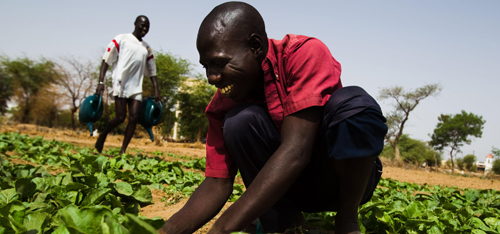Zambia
Zambia's small-scale farmers produce the bulk of the country's food needs – roughly 80 percent – as well as a number of cash crops, yet climate challenges, poor infrastructure and inadequate input-use undermine productivity, profitability and sustainability. The landlocked southern African country is prone to both drought and floods, and the overuse of land resources has degraded soils, making it difficult for farmers to get more from their land.
Poverty in Zambia is widespread, and many farmers lack access to markets and credit, as well as proper storage to keep their food and seed from spoiling. The country also has some of the world's highest HIV rates, which continues to affect the labour force.
Cotton is a growing industry in Zambia, providing a living to more than 350 000 smallholder farmers, and an important export crop. Inadequate access to quality seeds and fertilizers, low cotton productivity and price volatility are major issues plaguing the sector. In-country technical expertise to help farmers produce cotton more efficiently and sustainably is insufficient.
IPPM programme in Zambia
The IPPM programme, active in Zambia since 2014, is an implementation mechanism of the "Support Programme for the Consolidation of the Action Framework under the European Union-Africa Partnership on Cotton". It contributes to the application of COMESA’s regional cotton sector strategy as well as putting national strategies into action, to ensure a healthy, well-functioning cotton sector with improved production and consequently better rural livelihoods and food security.
IPPM activities in Zambia have focused on increasing the number of facilitators equipped with the technical know-how to boost cotton production sustainably. Some 30 facilitators have been trained during the 2014 cotton growing season to facilitate farmer field schools (FFS). These facilitators, in turn, have set up pilot FFS in their communities in order to share their knowledge with local farmers.
Training covers topics such as good agricultural practices, including the use of quality seed and the application of compost, for better crop growth. Given the heavy use of pesticides in growing cotton, the IPPM approach also educates farmers on the risks to human health and the environment. It encourages them to control pests biologically by strengthening their understanding of pests' natural enemies. Over the course of a cropping season, with support from the facilitator, farmers make field experiments to help solve their agricultural problems. They test and compare new agricultural practices and technologies to see what works best for healthy crop growth – including the use of improved varieties, better plant management techniques to boost productivity and reduce pest incidence, and use of biopesticides.
To date, the project has trained 30 facilitators in Mumbwa, a centrally-located zone that boasts a new producer-managed cotton company, as well as several cotton ginneries.
IPPM project in Zambia
Partners
IPPM is working with various partners in Zambia, including: Cargill; Common Market for Eastern and Southern Africa (COMESA); Continental; Cotton Association of Zambia; Cotton Board of Zambia; Cotton Development Trust; Grafax; International Institute of Tropical Agriculture; Ministry of Agriculture and Livestock; Mumbwa Farmers Ginnery and Processing Company; Zambia Cotton Ginners Association.
FAO is grateful to the European Union for its support of the IPPM programme in Zambia.

